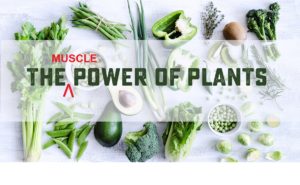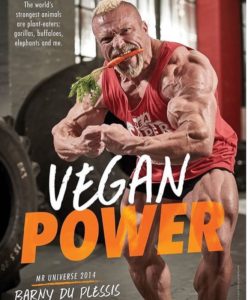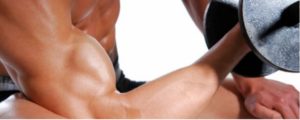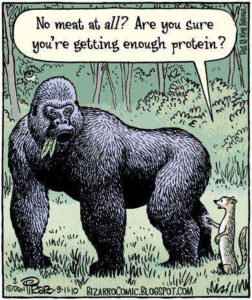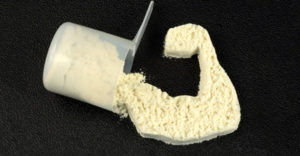
Robert Cheeke 1 is a leading light in the area of vegan bodybuilding. His advice 2 on whether or not we should use whey powders in an attempt to build muscle should probably be adhered to or, at the least, listened to and carefully considered.

For over fifteen years, Robert has been involved with the bodybuilding industry and knows how it works – basically, it’s kept afloat by the supplement companies that sponsor the athletes representing it. Naturally, the fans who admire these athletes end up buying the products they advertise. This ends up in a cycle that drives record sales and profits, all the while potentially damaging the health of the unsuspecting amateur athletes who just want to get as muscley and healthy as they perceive their heroes to be.
However, there are at least two reasons that Robert considers it important to question the real value of these protein powders – two of his favourite professional bodybuilders, Nasser El Sonbaty and Mike Matarazzo, who died in their forties, most likely due to the consumption of too much protein, coupled with the daily use of performance enhancing substances until their organs simply gave up on them.

He points out that though it’s obvious that bodybuilders exercise more than the average person, something that should improve overall health, the actual rate of bodybuilders suffering from diet-related health problems is often more common than the general public falling ill to diet-related diseases. He considers this to be a problem related to the wide-scale use of supplements – particularly protein powders – and it’s something that should be addressed.
The two powders of choice among mainstream bodybuilders are whey and casein. These are proteins from cow’s milk. Athletes adopt the mistaken notion that consuming more and more protein is a great idea with no downside, and this fallacy has been propagated for financial profit by the sports and supplement industries. Of course, they don’t bother to mention to proven 3 4 serious harms of excess protein in the diet.
Indeed, you’ll often hear warnings about the very opposite – that following a plant-based diet means protein will be hard to come by without consuming animal products. Not only are these warnings not based on any research data, they are shown to be false and misleading – if you eat enough food, you get enough protein, no matter what you eat 5 .
Cancer & milk protein
Years ago, The China Study ((The China Study)) by Dr. T. Colin Campbell & Dr. Thomas Campbell, showed how by merely changing the intake level of casein, cancer growth can be turned on and off like a switch. Dr. Campbell’s findings show that when casein is consumed in large quantities, cancer cells increase in size, and when there is a cessation in consumption of casein, cancer tumour cells recede.
Elevated levels of any animal protein, including casein and whey, cause:
- kidney damage
- kidney stones
- liver problems
- increase heart failure risk
- excess fat gain
- artery wall lining damage
- arterial plaque build up
- lethargy
- diminish bone density
- a host of other health problems ((Animal Protein – Nutritionfacts.org)) 6 7 8
Milk proteins, including casein and whey, have stronger links to prostate cancer than any other protein 9 . So why are they allowed to be produced as concentrated powders and drinks and sold in stores? After all, who needs them, besides calves?
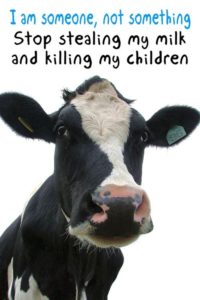
Protein deficiency?
If athletes in the West need to consume special protein powders created from cow’s milk, it begs the question: “is it because our society has particularly high rates of protein deficiency?”
The answer is simple – No. Protein deficiency is unheard of in Western societies and is only ever found in someone who does not consume adequate calories. Some level of protein is present in all foods, and in significant quantities in specific types of foods such as beans and other legumes, nuts, seeds, leafy green vegetables, other vegetables and grains. The amount of protein required by the human body (5-10% of total calories per day) is relatively low in comparison to the other macronutrients. It is therefore impossible to be protein deficient when sufficient calories are consumed. This is how nature works. In reality, most people in developed countries, including those following a plant-based diet, eat too much protein, not the other way around 10 .
Why propagate the protein myth?
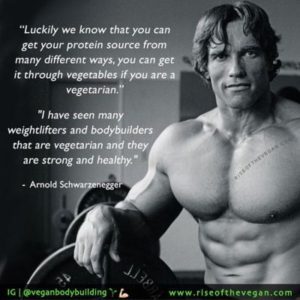
Robert points out that part of the answer lies in the world of bodybuilding and the magazines, books, websites, athletes, and other individuals that feed the industry:
“The community that I have been part of for so long is a key factor in keeping these antiquated ideas about protein alive. It is therefore my (and others’) mission to effectively dispel these myths by showing a healthier way to support fitness goals without the use of any substances that came from a cow’s udder. As a semi-retired bodybuilder and current health and wellness advocate and multi-sport athlete, I endorse a whole-food, plant-based diet for optimal results, even when bodybuilding. I aim to put the desire for elevated levels of protein to rest by showing how a relatively low protein, whole-food, plant-based diet can support all athletic endeavors effectively and efficiently. I have achieved great results as a plant-based athlete for the past two decades, and have sought to lead by example.”
It’s pretty obvious from the following, that his plant-based approach works…

No whey, man!
As Robert says, if your goal is health, then your answer to cow-based protein powders should be, “No whey, man.” Taking into consideration even just some of the research about the dangers of high levels of animal protein, particularly protein in cow’s milk, may hopefully lead people away from buying powders made from cow secretions.
Final thoughts
You get all the macronutrients, including protein, from a wholefood plant-based diet. Additionally, you get all the phytonutrients and fibre that are lacking in all animal foods.
Plant-based protein powders are not covered in Robert’s article. My research has shown me that even these are probably not worth bothering with, simply because the body does not need and cannot utilise excess protein intake – from any source, animal or plant. Additionally, although research has shown the body does not suffer the same negative health effects from excess plant protein as it does from excess animal protein, for me the jury is still out on whether there are benefits without deficits for packing in the pea protein. After all, it doesn’t seem that the likes of elephants or gorillas need protein powders to supplement their plant-based diets…
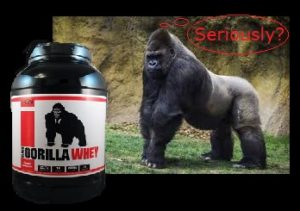
References
- Who is Robert Cheeke? [↩]
- No Whey, Man. I’ll Pass on the Protein Powder. By Robert Cheeke. November 7, 2014. [↩]
- The Problem with Protein [↩]
- Cow’s Milk – But It Looks So Innocent… [↩]
- Eat Enough Food & You Eat Enough Protein [↩]
- Animal Protein & Your Kidneys [↩]
- Circ Heart Fail. 2018 Jun. Intake of Different Dietary Proteins and Risk of Heart Failure in Men: The Kuopio Ischaemic Heart Disease Risk Factor Study. Virtanen HEK, Voutilainen S, Koskinen TT, Mursu J, Tuomainen TP, Virtanen JK. [↩]
- Independent: High protein diets like Atkin’s may increase risk of heart failure, finds study [↩]
- PCRM: Milk and Prostate Cancer: The Evidence Mounts [↩]
- Do Vegetarians Get Enough Protein? Michael Greger M.D. FACLM June 6th, 2014 Volume 19 [↩]
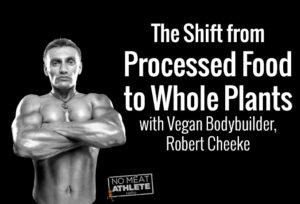
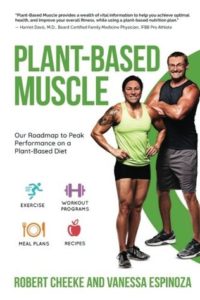
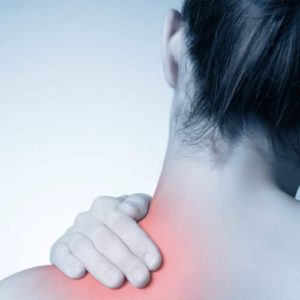 With better overall nutrition, we’re going to help with muscle recovery and muscle repair, and it will, of course, also help provide the best amount of energy before a workout.
With better overall nutrition, we’re going to help with muscle recovery and muscle repair, and it will, of course, also help provide the best amount of energy before a workout.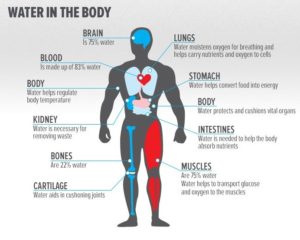 It’s not possible to overstate how important it is for optimum performance, injury-avoidance and after-exercise recovery to maintain high levels of hydration. Our muscles are 70% water. Our bodies are 70% water. Whole plant foods are really high in water, especially fruits and vegetables, and thus provide slow-release of the water contained within them.
It’s not possible to overstate how important it is for optimum performance, injury-avoidance and after-exercise recovery to maintain high levels of hydration. Our muscles are 70% water. Our bodies are 70% water. Whole plant foods are really high in water, especially fruits and vegetables, and thus provide slow-release of the water contained within them.